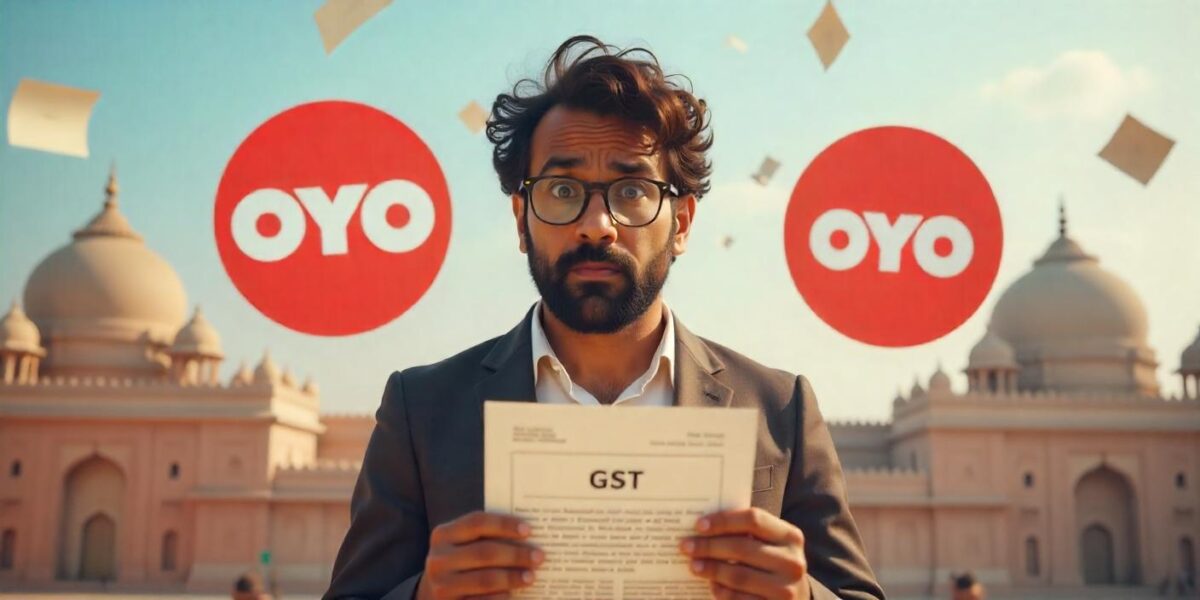“Sir, your GST liability is ₹2.66 crore,” said the officer, tapping the screen in front of him.
Madan Jain blinked. “Come again?”
“You owe ₹2.66 crore. Bookings worth ₹22.51 crore were reported from your hotel in the last financial year.”
Madan couldn’t decide whether to laugh or throw his chair. His resort — Samskara — had opened its doors to guests only three months ago.
This was not a tax notice. This was a punch in the gut.
What started as a business relationship between small hotel owners in Jaipur and India’s hospitality tech poster child, OYO, has now snowballed into what looks like a massive case of alleged fraud
And for once, the small guys are not staying quiet.
The Setup: “Partner With Us, We’ll Fill Your Rooms”
Like many hotel owners across India, Madan had joined hands with OYO to bring in more guests. It was a straightforward arrangement: OYO would list his hotel on its platform, handle bookings, and take a cut. In return, Madan’s hotel would get better visibility and hopefully, higher occupancy.
“Don’t worry about marketing,” they told him. “We’ll take care of everything. You just focus on hospitality.”
He agreed. So did many others.
It all seemed to work well — until the tax notices started arriving.
The Twist: Bookings That Didn’t Exist
One after another, hoteliers started discovering something strange. The government was holding them responsible for huge GST dues. But the bookings these taxes were based on? They never happened.
In some cases, bookings were shown for dates when the hotels were shut or even under construction.
One hotel, Kartikeya, received a ₹4 crore tax notice on “sales” worth ₹44 crore. The owners say they’ve never made more than ₹5–6 lakh in a good month.
Another hotelier, who wished not to be named, said, “We found bookings in our name for entire wedding parties — 80–90 guests. But there were no events, no payments, nothing in our system.”
According to the FIRs filed by these hotel owners, OYO’s system allegedly auto-generated bookings and cancellations, but still recorded the revenue in backend reports, without the hotel even being informed.
How Can We Pay Tax on Imaginary Guests?
Picture this: your hotel never hosted the guest, never received the payment, but is still expected to pay GST as if it did.
That’s the heart of the scandal.
Many hoteliers allege that OYO showed inflated bookings in order to boost its revenue figures, even if those bookings didn’t happen — and pushed the tax liability onto the hotel partners.
A total of over 100 hotels across Rajasthan are reportedly affected.
OYO’s Response
OYO has denied all wrongdoing. In their statement, they’ve called the allegations “baseless and an attempt to sensationalize what is a civil contractual dispute.”
They claim all transactions are accounted for transparently and that they never engaged in any activity to manipulate bookings or taxes.
But for the hotel owners who now face tax demands running into crores, this isn’t a civil misunderstanding. It feels like betrayal.
When The Guest Is a Ghost, But the Tax Is Real
What makes this case deeply unsettling is not just the scale, it’s the fact that many of these hotels are small, independently run properties.
They don’t have legal teams or compliance departments. They trusted a big brand to grow their business.
And now, they’re spending their days visiting GST offices, legal consultants, and chartered accountants, trying to prove they never hosted guests they’re being taxed for.
“This is not just about money anymore,” one hotelier told a reporter. “It’s about our reputation. Our trust. Our future.”
Why This Story Matters
We’ve covered dozens of cases involving fraud, misuse of credentials, false promises, and broken systems.
But this one hits differently, because it’s a reminder that not all scams come from strangers.
Sometimes, they come wearing a brand you trusted.
This case also highlights something more important: digital platforms must be held accountable for the systems they build.
Technology is not a shield for unethical practices. And small businesses are not collateral damage.
The FIRs are filed. The courts will take their time. But at least now, the hotel owners aren’t fighting in silence.







